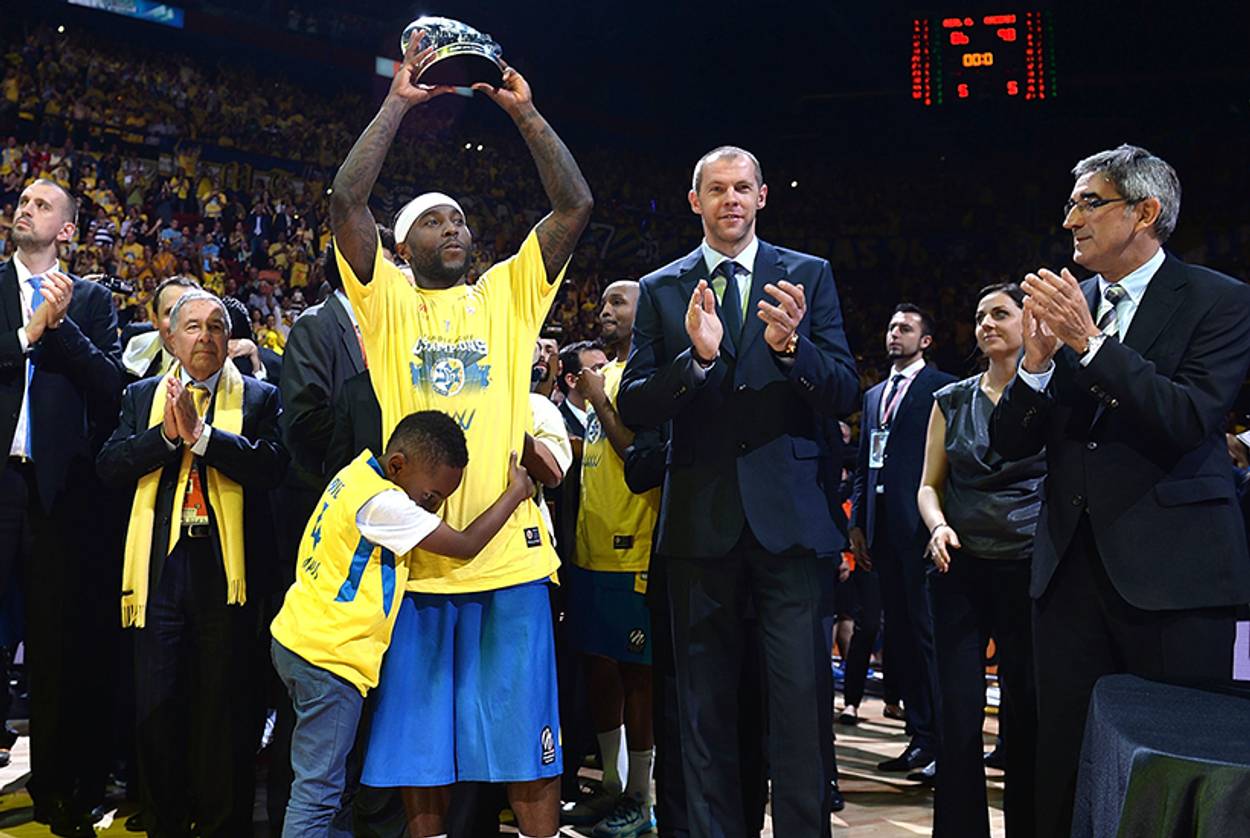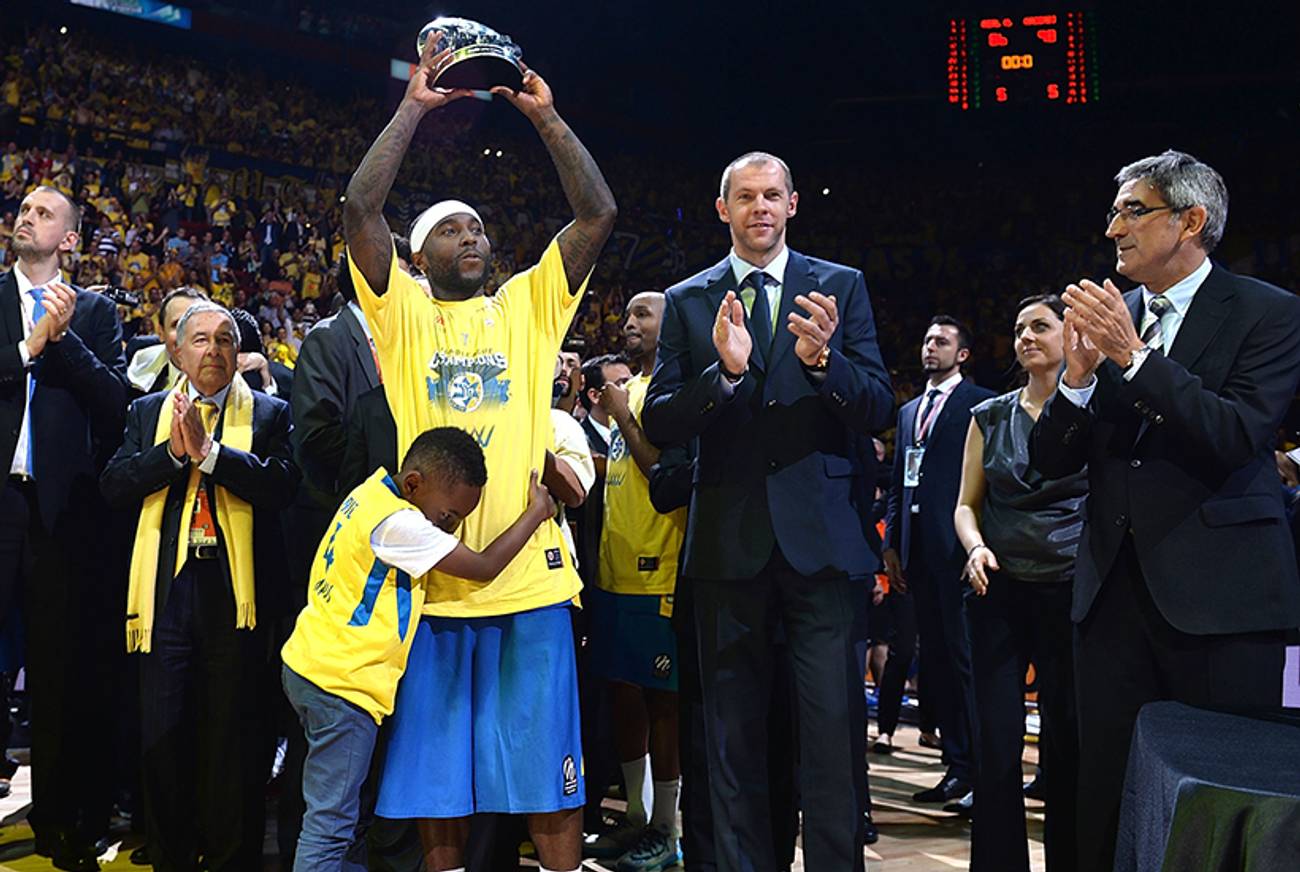Single Dad’s Hoop Dreams Come True in Tel Aviv
When the NBA passed on him, guard Tyrese Rice found a home in Israel—and led Maccabi Tel Aviv to its sixth Euroleague crown




Maccabi Tel Aviv point guard Tyrese Rice crashes to the bench courtside, exhausted and drenched in sweat. Around him, cameramen jostle for position to best capture the Euroleague MVP. Rice doesn’t miss a beat, grabs a mic, and leans in to the camera lens.
“Tal, mazel tov on your bar mitzvah. This is your special day, you’re the real MVP. Congratulations.”
It’s a little over two weeks after Rice led Maccabi to their sixth Euroleague championship, and here at the end of practice in Tel Aviv, bar mitzvah boys are lining up for video blessings and selfies with the guard, who earlier in the season was a second-string player who seemed in danger of being cut.
None of the bar mitzvah pictures Rice took last week could rival the one he took at the end of the Euroleague championship game on May 18—on the floor in Milan, confetti in the air, his 8-year-old son Ashawn with his arms around his father’s waist as he held his Final Four MVP trophy aloft. “That picture represented all the work that’s been done since he was born,” Rice said, describing the years spent raising a baby boy born when he was 18 and leaving to play ball at Boston College. “I didn’t have those young years where you could do whatever you want to do. So, that moment was seeing all the work and sacrifice I’ve put in since he was born all wrapped in one.”
***
Originally from Virginia, Rice moved to Israel by way of Boston College, where he was an all-ACC point guard who in 2008 scored 46 points as a junior against the third-ranked University of North Carolina, including 34 points in the first half. In 2009, in Rice’s senior season, the website Bleacher Report pointed out his average of 17 points per game over his first three years in college ball and wrote “Tyrese Rice, the Rodney Dangerfield of the ACC, simply cannot get respect,” an observation that proved prophetic when he was ignored in the NBA draft.
One place Rice did get some respect—and a fast track to citizenship—was in Europe, where he headed when his NBA dreams failed to pan out—playing in Lithuania, Germany, and Montenegro. That’s how Rice became a Montenegrin citizen, spending last summer playing basketball in Podgorica, the capital of Montenegro. “I have a [Montenegro] passport. I’ve used it before to check in at the airport just to see if I could use it. It’s a legit passport, it works,” Rice said this week, over a pan of sautéed shrimp and a mammoth corned-beef sandwich at a restaurant in Azorei Hen, a posh neighborhood of north Tel Aviv where he and most of his Maccabi teammates live.
Rice, 27, knows his story is odd and that people don’t hear about single fathers every day, much less young male athletes who are doing it on their own. He said there’s no dark backstory and that “there’s nothing wrong with [Ashawn’s] mother, it just worked out like this.” Ashawn, who has spent most of the season living with his grandmother back in Virginia, isn’t Rice’s only inspiration on the court. On Rice’s left wrist he has a tattoo of a watch, frozen to the date and time his older sister died of breast cancer, just as he was heading off to college. But in his first few months with Maccabi, neither source of inspiration seemed to be enough, as he spent most of the season riding the bench. Possibly the lowest point in his then-disappointing season was a game against Russian team PBC-Lokomotiv Kuban in Moscow in March, where he racked up one basket and one assist in 10 minutes in place of starting Maccabi point guard Yogev Ohayon.
The underdog role also fit Maccabi Tel Aviv this year, long considered one of the top teams in the Euroleague. In addition to their six European championships—including back-to-back titles in 2004-2005—they’ve been a juggernaut in Israel for decades, winning 51 Israeli championships, including every year from 1970 to 1992. In recent years however, Maccabi’s prestige has tarnished, and the team was not expected to make it to the Final Four this year, much less bring home a championship.
The team got to the final in heroic fashion, with Rice sealing the victory over powerhouse CSKA Moscow in Milan with a steal and a layup with five seconds left on the clock. Two nights later, against heavily favored Real Madrid, Rice entered the pantheon of European basketball greats, with 26 points, 21 of them in the fourth quarter and overtime.
With his performance against Real Madrid, Rice joined a list of American basketball players who went undrafted or drifted out of the NBA only to reemerge as Israeli national heroes with Maccabi Tel Aviv. These names include now-retired guard Derrick Sharpe from Florida, a 15-year veteran and captain who led the team to its Euroleague victories in 2004-2005 and played on the national team as a naturalized citizen. Decades before Sharpe, there was Aulcie Perry, a 6-foot-10 center from New Jersey who led Maccabi to its first and second European titles. Along the way he became a household name, converted to Judaism, and became an Israeli citizen. (Perry was later caught smuggling heroin into the United States from Amsterdam and spent eight years in prison, but he remains a hero in Israel.)
Altogether there were three Americans on this year’s starting five for Maccabi, as well as colossal Greek-Cameroonian center Sofoklis Schortsanitis. On the bench, with Rice, there’s three other Americans and the Australian Joe Ingles. Rice said most of the players live in this quiet suburban corner of far-north Tel Aviv, near Herzliyah, where next year Ashawn will enroll in an American school. Rice said he and his teammates carpool to games and practices together and let their wives borrow each other’s cars, go bowling, or head out to bars, and it appears they chat nonstop on their “Maccabi Players” WhatsApp group.
Though some of their former American college peers who are now in the NBA may see them as failures, players like Rice seem to feel they’ve hit the jackpot in Tel Aviv. “I’ve never been anywhere like this,” Rice said. “What’s not to like? It’s amazing. The [great] weather all the time, great restaurants everywhere, plenty of nightlife if you into that, beautiful women everywhere, great basketball, what else you need? For me there’s not much else I need.” He added that when some friends from home visited, he nearly had to force them onto the return plane.
Rice joked that other former Maccabi players “set the bar really high for Tel Aviv.” One who told him “You’re going to heaven” when he signed with the club—and would text him asking “How you likin’ heaven right now?”
Heaven sounds about right to Maccabi guard Ricky Hickman, a North Carolina native who joined the team in 2012. “It’s almost like being in college again because the fans and people really embrace you, and they show you love here,” said Hickman, who went undrafted after leaving UNC-Greensboro in 2007 and took a job loading trucks for the Post Office in North Carolina until after Thanksgiving, when he got a call from a Romanian club offering him a job. But playing ball in Romania, it turned out, wasn’t much better than working for the Post Office.
“I played in Romania and Finland and lower leagues, and some of them, it’s like a disaster being there. The working conditions are just terrible and if you’re not mentally strong, you’re going to end up just going back home and getting a job,” he said.
Like Rice, Hickman—who was also given citizenship by Georgia to play for their national team—said that signing with Maccabi was taking a step forward, even if some people in the United States didn’t quite get it. “My mom was like ‘Is it safe over there? Is it a good idea to be there?’ Everybody thinks there’s a war going on over here all the time,” Hickman said.
There are also moments when the cultural differences between Israel and the United States emerge in unpleasant ways. On May 27, a little over a week after the Maccabi victory, Oded Tira, the chairman of the National Council for Sport, used the term kushim, a derogatory Hebrew term for black people, when describing the team’s victory. During an event to congratulate Maccabi chairman Shimon Mizrahi, Tira said how some people were dismayed that the club “played with five kushim throughout much of the game.” Though there was a short-lived controversy and Tira apologized to the Maccabi players, he faced nowhere near the retribution of Donald Sterling, the Los Angeles Clippers owner who in April was banned from the NBA for life and fined $2.5 million by the league after private recordings of racist comments he made about black people were made public.
“I don’t really care if he’s a racist or not honestly, he made the comment, it’s wrong, but for me I don’t care because I don’t know this guy, he doesn’t know me, that’s what he thinks, that’s what he thinks. People aren’t going to know him or love him or us any less than they do because of it,” Rice said, when asked about the controversy.
Forward David Blu, the mixed-race son of a white Jewish mother and an African-American father, also appeared to take a forgiving stance. “I never want to judge somebody by what they say but by what they do and how they act toward me. He made that comment and came in that same night and apologized. Sincere or not, he made the effort.”
Blu, who grew up in Los Angeles and played for USC, will be 34 next month. On Wednesday he played what he said would be his last basketball game, as Maccabi Tel Aviv beat Maccabi Haifa for their 51st Israeli championship title. With an upbringing that included celebrating Jewish holidays and playing in the 1997 Maccabiah Games in Israel as a teen, Blu (then “Bluthenthal”) came to Tel Aviv with a bit more familiarity with the religion and the culture. He attained Israeli citizenship and started taking Hebrew “ulpan” classes, but his feet didn’t quite touch the ground until he learned to embrace his Israeli life for its own sake, and not as a substitute for playing NBA ball. “Americans come over here to make money,” he explained. “My rookie year I came over here for a paycheck and to make it to the NBA. Once I learned that the key is to try to understand where you are and where you live, I started to enjoy it.”
For his part, Rice said he has acclimated well to Israel, but he still has his eyes set on returning to the United States. In five years he’ll have spent 10 years playing pro ball, which is how he planned it. He said he’s looking to buy a house in Katy, Texas, a suburb of Houston. On Maccabi’s dream season and his newfound status as an Israeli sports hero he said simply, “It’s one of those things you embrace because you don’t know if one day it’s not going to happen anymore.”
***
Like this article? Sign up for our Daily Digest to get Tablet Magazine’s new content in your inbox each morning.
Ben Hartman is the crime and national security reporter for the Jerusalem Post. He also hosts Reasonable Doubt, a crime show on TLV1 radio station in Tel Aviv. His Twitter feed is @Benhartman.
Ben Hartman is the crime and national security reporter for the Jerusalem Post. He also hosts Reasonable Doubt, a crime show on TLV1 radio station in Tel Aviv. His Twitter feed is @Benhartman.